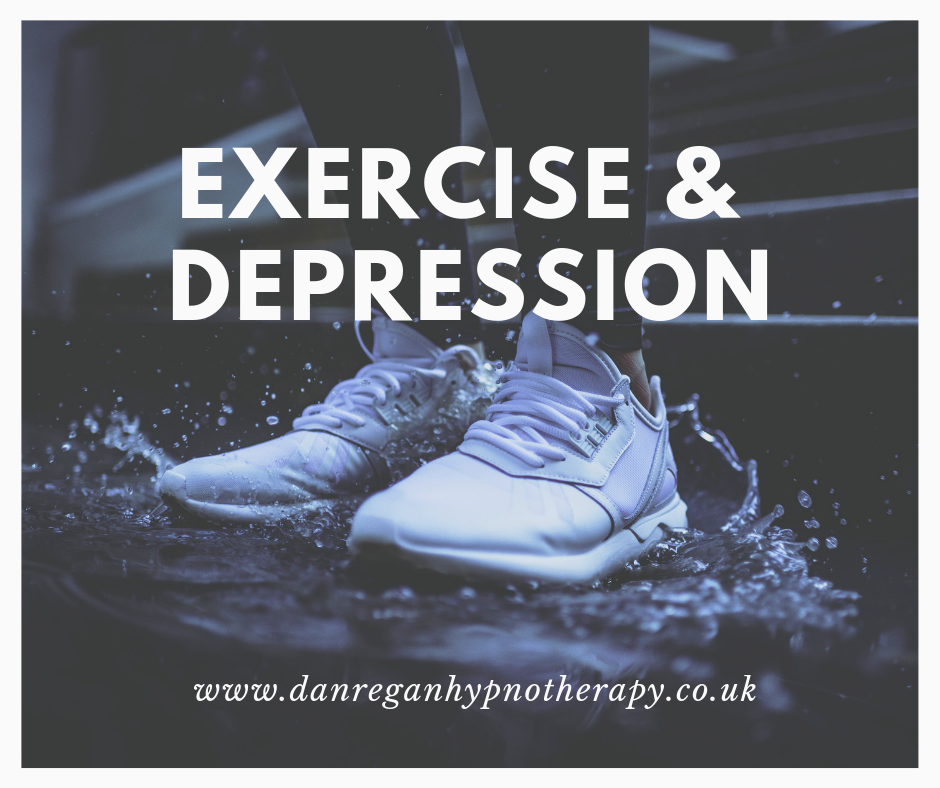Required
Depression: Does aerobic exercise have anti-depressant effects?
Depression: Does aerobic exercise have anti-depressant effects?
It’s no secret, if you have read through some of these blogs, that exercise forms one of the main pillars of how I organise my life. In the past this was solely running focused and these days it incorporates several bootcamps a week with some short running. Exercise is important to me and boosts my sense of physical fitness and mental health.
Funnily enough when I was younger I hated exercise (I blame cross country in the rain at school). I had no interest in it and I was overweight, which put me off it even more because of the increased perceived effort required. Later life showed that once you find something that you enjoy and that makes you feel better in yourself then you can turn it around and find that you benefit from habitually exercising. Or as someone put it to me recently (a non-exerciser), I’m one of those weirdos who really enjoys exercising.
My own personal experience has been that exercise boosts my mental health. When there is a lot going on or an element of stress or worry in life then a good bootcamp or run helps me to process it and cope with it and emerge feeling mentally stronger.
And it isn’t just me who has found that exercise benefits mental health. There is a growing body of research that supports this and in this article I’ll be looking at a couple of research reviews that tell us a lot about how exercise can benefit people with depression.
As mentioned, these days my exercise involves bootcamp; which often means hanging around a bit!

Whereas in the past I used to love a good old marathon (even if I had to hold my leg on with sticky tape):
Yet whilst I could discuss my own experiences (in depth!) the question arises about whether aerobic exercise does actually offer an anti-depressant effect to those with clinical depression. Here’s the evidence…
Aerobic Exercise For Depression
Although exercise is associated with depression relief, the authors of a 2018 research paper noted that the effects of aerobic exercise interventions on clinically depressed adults had not been assessed.
Morres et al. (2018) carried out a systematic review and meta-analysis to examine the anti-depressant effects of aerobic exercise (versus non-exercise comparators) for depressed adults (18-65 years) recruited through mental health services with a referral or clinical diagnosis of depression. Their analysis looked at 11 studies involving 455 patients.
One thing that is particularly noteworthy about this research was that they only used data from people with depression recruited via mental health services. Often researchers will advertise for participants and this creates the possibility of results being distorted as these people may not have actual clinical depression and, through the very act of volunteering, they may be more motivated and determined to exercise and make other lifestyle changes. In contrast, a common feature of clinical depression is a lack of motivation, energy and persistence which can lead to elevated dropout rates.
In conclusion, the research found that aerobic exercise “showed a significant large overall anti-depressant effect” on adult patients recruited via mental health services with a referral or a clinical diagnosis of major depression. Aerobic exercise “brought about a large or moderate to large improvement in depression in a wide range of delivery formats through equipment-based or equipment-free modalities, inside or outside a hospital, outdoors or indoors, in groups or individually, and in cohorts with outpatients or inpatients, and with different depressive symptom severity.”
The net result appears to be that aerobic exercise certainly does have an anti-depressant effect in people with depression and that makes it worth considering and including in your treatment plans.
One thing many research papers look at is the level of confidence of their findings and whether they are robust. The researchers here found that it would require 218 studies with no anti-depressant effect for aerobic exercise to nullify the significance of their main findings. That’s pretty robust by anyone’s standards.
There were also a couple of other interesting findings from this review. They found short term (up to four weeks) aerobic exercise showed a moderate to large effect on depression, which could suggest it provides an important role in the early stages of treatment as many anti-depressant prescription medicines can take that sort of length of time before they provide benefit.
They also found that aerobic exercise involving personal preferences of the type of activity revealed large anti-depressant effects. This can be important, because as anyone who has ever exercised knows, if you don’t choose it and enjoy it then the chances of staying motivated diminishes.
The other really interesting thing was that the aerobic exercise showed similar drop out rates to non-exercise comparators. As exercise is perceived as requiring more time and more effort than many other health behaviours, this again suggests that such exercise could play a vital role in depression recovery.
In their final conclusion to this review and analysis (AE = aerobic exercise),
“This is the first meta-analytic study to compare the anti-depressant effects of AE to treatment for depression excluding exercise activities, in adult patients (18-65 years) with a referral or clinical diagnosis of major depression, who were recruited through mental health services and not through media advertisements. Supervised AE compared favourably to treatments for depression across various delivery formats, comparisons, or settings, and regardless symptom severity and type of outcome measure. Importantly, the anti-depressant effect of AE was not affected amongst trials with lower risk of bias, trials with short-term (up to 4 weeks) exercise interventions, or trials with interventions including individual preferences for exercise. Notwithstanding the limited number of trials reviewed, AE was found to be an effective anti-depressant intervention.”
Pretty encouraging stuff that suggests that, if you struggle with depression, aerobic exercise may be a useful strand of recovery and improvement alongside other therapeutic or pharmaceutical approaches.

More on Exercise Interventions for Mental Health
Another meta-analysis by Stathopoulou et al,. (2006) looked at treatment outcomes from exercise for depression and some other mental health issues. They found that “an increasing number of outcome studies provide evidence for the efficacy of exercise interventions for clinical samples.”
Their analysis suggested that anaerobic exercise may be equally effective in reducing depressive symptoms compared to aerobic activity, which suggests that resistance training may be an option for those where aerobic exercise is inappropriate or where they do not have the motivation for aerobic exercise. They also found from their analysis that there was evidence to suggest significant benefit from exercise to help with cravings from alcohol abuse, specific thoughts associated with bulimia and for anxiety related symptoms.
One of the most interesting facets of this analysis was that they looked at the possible mechanisms by which exercise exerts its positive effects on mental health, although the actual mechanism is not yet certain. It may be a physiological thing through changes in the metabolism and availability of central neurotransmitters (e.g. serotonin). Some mental health benefits of exercise may occur from improvements in the quality of sleep that tend to go with exercise.
It may be that there is a psychological reason for the mental health benefits of exercise. Engaging in exercise may increase perceived coping skills for depression, or may alter the accessiblity or intensity of ruminations, worries and anxiety. In addition, exercise involves action “that is inconsistent with the natural action tendencies associated with depression (passivity) and anxiety (avoidance).” Thus by doing something that is inconsistent with depression you experience a different result; often with my own anxiety and depression clients I will actively encourage them to do specific things that conflict with unwanted habitual thoughts and feelings and which can start to create some leverage towards them feeling better.
As they conclude, “Our meta-analysis of 11 well-controlled studies yielded a large combined effect size…indicating that exercise can be a powerful intervention for clinical depression.”
Often I read comments about depression on social media where people deride exercise as a therapeutic approach to combating depression and anxiety. Yet whilst they may belittle it and write things like ‘stop telling me to go for a walk’, the evidence all strongly suggests that exercise can play a useful role here. That’s not to say that all other treatment approaches and strategies should be abandoned in favour of exercise. Yet research after research suggests that for many people with anxiety and depression, it may serve a beneficial role alongside other treatment.
And if all the research is suggesting that something can help you feel better, and overcoming depression and anxiety is your goal, then certainly it must make sense to at least give it a period of sustained commitment to find out how it works for you, mustn’t it?
Now of course, hypnotherapy can help in many ways with the psychological aspects of depression, including motivation and tackling rumination, anxiety and worry. In my next blog I’ll have a little look at the evidence for the effectiveness of cognitive hypnotherapy on depression.
To your success,
Dan Regan
Hypnotherapy in Ely & Newmarket
Seeking help to overcome your depression? Book your Complimentary Hypnotherapy Strategy Session with Dan now: Appointments
Find out what other people have said after their hypnotherapy sessions with Dan: What People Say
And check out these powerful hypnosis downloads that can start helping you feel better right away: Hypnosis Downloads
References:
Morres, Ioannis D., Antonis Hatzigeorgiadis, Afroditi Stathi, Nikos Comoutos, Chantal Arpin‐Cribbie, Charalampos Krommidas, and Yannis Theodorakis. “Aerobic exercise for adult patients with major depressive disorder in mental health services: A systematic review and meta‐analysis.” Depression and anxiety 36, no. 1 (2019): 39-53.
Stathopoulou, Georgia, Mark B. Powers, Angela C. Berry, Jasper AJ Smits, and Michael W. Otto. “Exercise interventions for mental health: a quantitative and qualitative review.” Clinical psychology: Science and practice 13, no. 2 (2006): 179-193.
Get Your Copy Right Now…
Subscribe to Dan’s Digest filled with tips, strategies and techniques and get instant access to your free rapid relaxation hypnosis audio track.
Enjoy feeling and being more mentally calm and physically relaxed right now:




0 Comments